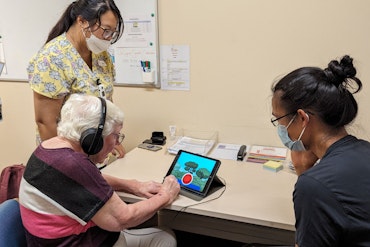How to help people with dementia eat at home
Looking to make mealtime easier? Look no further than some top tips from care experts.
![<p>Do you have a loved one with dementia who needs support with eating? [Source: Shutterstock]</p>](https://agedcareguide-assets.imgix.net/news/articles/wp/dementiasupporteatathome__1902.jpg?fm=pjpg&format=auto&w=550&q=65)
Do you have a loved one with dementia who needs support with eating? [Source: Shutterstock]
Key points:
- In 2024, it is estimated that more than 1.6 million people in Australia are involved in the care of someone living with dementia
- The Australian Institute of Health and Welfare estimated that in 2022 there were between 137,600 and 354,200 informal primary carers of people with dementia
- Eating problems can come about because of a progressive decline in the person’s memory, thinking, planning and judgement
Researchers have investigated a potential intervention for people with dementia who experience difficulties eating at home.
The home environment can pose challenges for both the patient and those providing care — confusion and functional problems linked to dementia and a lack of caregiver support for friends and family members thrust into the role, to name a few.
Based on the available data, the AIHW estimated that in 2022 there were between 137,600 and 354,200 informal carers of people with dementia who live in the community.
Interviews with a range of health professionals for a new study, published in the journal The Gerontologist, identified strategies to make eating go more smoothly.
Lead author Lisa Juckett explained that strategies could be employed, such as reducing distractions and clearing away clutter, using written cues and leveraging assistance that can come from a community-based nutrition program like Meals-on-Wheels.
“It comes down to keeping things simple. How do we keep that environment as simple as possible so people’s eyes and ears aren’t distracted and taking their attention away from their food?” she said.
“For people with dementia, it’s not just ‘I forget to eat and therefore that’s why I’m at risk of malnutrition,’ which some people might think. It’s the combination of all these other factors that really come into play, which is why eating is complex — it’s much more than bringing a fork to your mouth.
“We know that the older adult population is growing and older adults are living longer, but that doesn’t mean they’re living lives that are healthier and disease-free.”
The latest available data from the Australian Bureau of Statistics Survey of Disability, Ageing and Carers revealed the most common reasons for primary carers of people with dementia to take on the caring role was:
- family responsibility — 64 percent
- they could provide better care than someone else — 46 percent
- alternative care is too costly — 42 percent
- no other family or friends were available — 32 percent
“Alzheimer’s and related dementias are expected to be on the rise over the next several decades and it’s estimated that the healthcare system won’t be able to keep up with addressing the needs of people with dementia,” she added.
“That places more burden on caregivers who are not paid to do this but want their loved ones to stay at home because that’s where the majority of people want to age — at homes and in communities of their choosing.
“We wanted to give caregivers actionable steps and strategies that they can try out with loved ones at home because they already have a lot going on.”
Juckett interviewed 20 professionals for the study whose work involved providing community-based care to people with dementia, including registered nurses, speech-language pathologists, social workers, occupational therapists, counsellors and registered dietitians.
The experts targeted potential sources of confusion, distraction or forgetfulness that made mealtime more difficult for people with dementia in a home setting and advised that carers:
- lower auditory and visual distractions;
- eliminate household clutter, clear pathways and improve lighting;
- provide written instructions to guide patients’ mealtime activities.
Establishing an association between a table and eating can improve the routine, according to the professionals, but for people with dementia who prefer to eat on the couch, ensuring they’re sitting upright can help keep them safe when they swallow.
Along with Lisa Juckett, who is an assistant professor of occupational therapy at the Ohio State University School of Health and Rehabilitation Sciences, co-authors of the study included Mequeil Howard, Shannon Jarrott and Lorraine Mion of Ohio State, Beth Fields of the University of Wisconsin-Madison and Kali Thomas of Brown University.
She attested to the benefit that programs such as Meals-on-Wheels can have for people with dementia who live at home.
“Meals-on-Wheels could be powerful for addressing the needs of people living with dementia, of course, but also at providing some relief and reduced burden for the caregiver as well,” Juckett said.
Her next step will be to research and interview carers about their experiences with mealtime and identify how closely their insights align with the advice from professionals.
In addition to this research on improving mealtime at home for people with dementia, Better Health Victoria has some practical advice to streamline the experience — including how to recognise a person’s history with a given food and adapt to changes.
For more support, please visit the National Dementia Helpline or call 1800 100 500; access the Dementia Behaviour Management Advisory Services 24/7 helpline by calling 1800 699 799.
Is mealtime easy in your household? Let the team at Talking Aged Care know your experiences as someone who cares or receives care and subscribe to the newsletter for more information, news and industry updates.
Related content:
The dementia diet: Mediterranean meals























